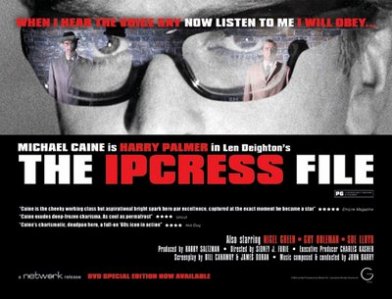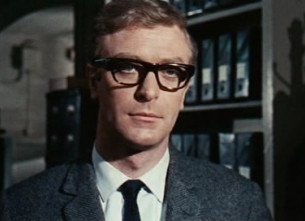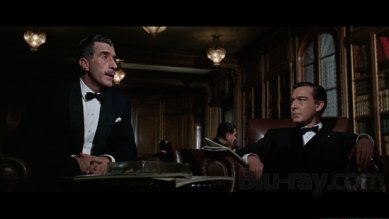|
The Ipcress File - The Bureaucratic Bond

The Ipcress File is a 1965 British spy film directed by Sidney J Furie
and based on Len Deighton's 1962 novel. The central protagonist is
Harry Palmer (Michael Caine), a former army sergeant now working as an
intelligence agent for an organisation in the Ministry of Defence.
While on a dull and lengthy stakeout surveillance operation, Palmer is
recalled by his superior - Colonel Ross (Guy Doleman) - and told he is
to be transfered to a counter-intelligence bureau run by a Major Dalby
(Nigel Green). He is given a brand new mission and ordered to replace
an agent who was killed that morning while trying to prevent the
kidnapping of a scientist called Radcliffe (Aubrey Richards). Palmer
must investigate why a number of British scientists are being kidnapped
and returning without the ability to function in their duties anymore
and - more importantly - find the source of this apparent brain drain.
But as he becomes more deeply involved in this puzzling and complex
mystery, Palmer finds it harder and harder to work out who he can trust
as his own life comes under increasing threat. To fulfill his objective
he must uncover the secret of the Ipcress file...
A very stylish sixties antidote or counterpoint to the fantastical and
glossy James Bond series - then at the height of its popularity with
1965's Thunderball still the highest grossing Bond film of all time
pound for pound inflation adjusted - it was ironically Bond producer
Harry Saltzman who decided to use Deighton's novels as the source for a
very different type of cinematic spy series. Whereas Sean Connery's
agent was lavishly equipped with ingenious gadgets, visited numerous
exotic sun-drenched locales, frequently wore a tuxedo and saved the
world on a regular basis in a total fantasy environment with absolute
loyalty to Queen and Country, Harry Palmer was a downbeat, cynical,
anti-authoritarian spy who wore thick NHS specs, shopped in
supermarkets and munched on cornflakes. It was a clever move to go in a
radically different direction by Saltzman and subsequently the Palmer
series exists on its own terms as an intelligent and interesting series
of films rather than leave itself too open to the charge of being a
Bond clone in an era that was festooned with them.

The emphasis here is on a more downbeat, film noir detective atmosphere
and while James Bond is a playboy of sorts, an urbane expense account
snob and former Royal Navy Commander who had a private education, Harry
Palmer is an ordinary Joe, working off a two-year sentence for black
market activities he undertook in Berlin once. "It isn't usual to read
a B-107 to its subject, Palmer," says Dalby. "But I'm going to put you
straight. Insubordinate. Insolent. A trickster. Perhaps with criminal
tendencies." An obvious strength of The Ipcress File is that Harry
Saltzman was able to employ regulars from the Bond series he owned and
produced with business partner Cubby Broccoli. Talented and brilliant
people like the production designer Ken Adam, editor Peter Hunt and the
legendary film composer John Barry. Barry's music is hugely atmospheric
and haunting and the film even has a Bond style sequence before the
credits. The presence of an understated Michael Caine is of course
another big plus. This was probably the role that firmly established
Caine as an instantly recognisable international star. "Dalby," says
the morose Ross. "Doesn't have my sense of humour". "I shall miss
that," replies a deadpan Caine. Palmer's disdain for authority makes
for a refreshing temporary contrast to Bond.
The Ipcress File has a strange off-kilter and mildly surreal quality,
with unusual camera angles and blurry lenses, symbolising the confusion
of Palmer as the case becomes more complex. The plot is full of
intrigue and twists and turns and our bespectacled hero is never quite
sure who can or cannot be trusted. Sean Connery is a man in total
command of his surroundings and prowls through the James Bond films
like a shark but Palmer is manipulated and insubordinate, trying to
accomplish his mission but vaguely aware that he is a possibly a pawn
with higher, shadowy forces at work. His anarchic streak though makes
him a dangerous man to underestimate. The low camera angles and use of
foreground objects, plus some enjoyably authentic London locations and
landmarks, make The Ipcress File a very inventive film that is always
interesting to look at. When Palmer has a spot of fisticuffs in one
sequence we seem to be far from the action like bypassers, the flashy,
unconventional direction somehat ahead of its time. We see through key
holes and phone boxes as if we are secret operatives ourselves at times
trying to keep up with the characters and follow what is going on.

Nigel Green and Guy Doleman are both suitably commanding and sarcastic
as Palmer's two bosses and believable as military types in gentlemen's
clubs and Gordon Jackson also appears in the film as Carswell. It's
Michael Caine though who is the star in what became an iconic role for
him. Harry Palmer is a likeable and more realistic type of spy hero and
Caine - then best known for his turn in Zulu - is perfectly cast. As a
nod to Len Deighton, Palmer loves cooking and we enjoyably see him
shopping in a sixties supermarket, large supermarkets then still a
relatively novel thing in the Britain of that era. "Beef-A-Roni?" says
Ross after tracking Palmer down while he's stocking up on a few
groceries. "Extraordinary." The Ipcress File is perhaps a little
dialogue intensive with a very twisty plot but the film is always very
watchable and entertaining with much intrigue and atmosphere and
contains a memorable element of sixties physchadelia, a mind altering
torture/proceedure involving weird electronic sounds, strange images
and flashing lights.
Despite a few dated elements, The Ipcress File is a very interesting
and stylishly taut spy thriller with a great cast, wonderful music and
a real sense of period and location that makes it especially enjoyable
to watch today. Michael Caine is terrific as a sort of working-class,
bureaucratic, downbeat James Bond and while all the Palmer films are
well worth a look this is certainly the best and most realistic of the
series.
- Jake
c 2010
Alternative 007
|

|


